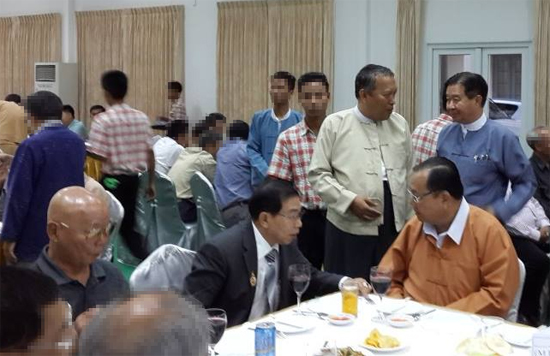Resistance leaders that attended a meeting yesterday to discuss the latest developments in the ongoing process say if the text of the nationwide ceasefire agreement covers no more than the original 5 point guideline laid down by the President on 1 March 2012, few movements will show up at the actual signing ceremony.
“Most likely, no one’s going to show up,” said a prominent leader who requested his identity be withheld.
According to the 5-point guideline, both sides would agree:
- To stop all hostilities
- To stay only in the agreed areas
- Not to hold any arms in places except from those agreed areas
- To open liaison offices in the mutually agreed places
- To fix the venue, time and date for Union level dialogue
U Aung Min, Vice Chairman of the Union Peacemaking Work Committee (UPWC), when asked by Lt-Gen Yawd Serk, leader of the Restoration Council of Shan State/Shan State Army (RCSS/SSA), on 15 June how the second signing would be different from the first, replied: “The difference is that at the second signing, it will be witnessed by dignitaries all over the world. All those concerned will sign it. Afterward, nobody will be able to renege on it and reverse the process even if he wants to.”

So far, 13 resistance movements have signed ceasefire with Naypyitaw. Those remaining to sign it include the Kachin Independence Organization/Kachin Independence Army (KIO/KIA).
“We need to have a comprehensive peace agreement which not only includes ceasefire, but also a framework for political negotiations,” he said, speaking on the sideline of the meeting.
The Working Group for Ethnic Coordination (WGEC), formed by representatives of the ethnic armed movements and civil society organizations in 2012, has already drafted a comprehensive agreement, which also contains:
- Common principles
- Framework for political dialogue
- Transitional arrangement
- Scope of participation
- A 19-point dialogue issues
- Military Code of Conduct
Speaking to the parliament on Friday, 28 June, U Aung Min said, “The government has a plan to hand over the task of organizing political dialogue to Parliament,” after the signing of the nationwide ceasefire, according to Eleven Media.
Following Aung Min’s address, Shwe Mann, Lower House Speaker, has called for direct involvement of the Parliament in the peace process on Tuesday, 2 July.



